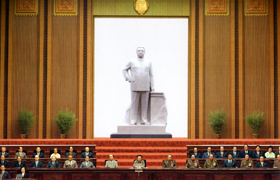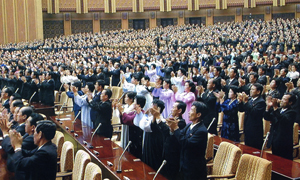|
|
|
The SPA is the body of highest political power,
as stipulated by the ‘Socialist Constitution’ of
North Korea. Although it acts as an assembly in
that it performs legislative functions, the powers
granted to it by the constitution are far greater.
In reality, the SPA is a rubber-stamp assembly that
merely passes laws and decisions handed down by
the KWP.
Assembly meetings are held once or twice a year.
Matters dealt with during such sessions include:
approving the national budget, appointing members
of the Cabinet and other key state bodies, and passing
laws. During recess periods, the functions of the
SPA are carried out by the Standing Committee. Each
administrative division has its own regional people’s
assembly. |
|
 |
 |
| 1st
Meeting of the 11th SPA, September 2003 |
|
|
|
|
|
 Authorities of the SPA
Authorities of the SPA |
 Amending/revising
the constitution Amending/revising
the constitution
 Legislating/amending/revising
laws Legislating/amending/revising
laws
 Approving
laws passed by the SPA Standing Committee during
recess Approving
laws passed by the SPA Standing Committee during
recess
 Drawing
up frameworks for domestic/foreign policy Drawing
up frameworks for domestic/foreign policy
 Appointing
or recalling the Chairman of the National Defense
Commission Appointing
or recalling the Chairman of the National Defense
Commission
 Appointing
or recalling the members of the SPA Standing Committee Appointing
or recalling the members of the SPA Standing Committee
 Upon
consultation with the Chairman, appointing or recalling
the 1st Division Chief, Vice Chairman, and members
of the National Defense Commission Upon
consultation with the Chairman, appointing or recalling
the 1st Division Chief, Vice Chairman, and members
of the National Defense Commission
 Appointing
or recalling the Vice Chairman, Honorary Vice Chairman,
Secretary, and members of the SPA Standing Committee Appointing
or recalling the Vice Chairman, Honorary Vice Chairman,
Secretary, and members of the SPA Standing Committee
 Appointing
or recalling the Premier of the Cabinet Appointing
or recalling the Premier of the Cabinet
 Upon
consultation with the Premier, appointing or recalling
Vice Premiers, Chairmen, Ministers, and other Cabinet
officials Upon
consultation with the Premier, appointing or recalling
Vice Premiers, Chairmen, Ministers, and other Cabinet
officials
 Appointing
or dismissing the Head of the Central Prosecution
Agency Appointing
or dismissing the Head of the Central Prosecution
Agency
 Appointing
or recalling the Chairman of the Central Court Appointing
or recalling the Chairman of the Central Court
 Appointing
or recalling Chairmen, Vice Chairmen, and members
of each SPA Committee Appointing
or recalling Chairmen, Vice Chairmen, and members
of each SPA Committee
 Inspecting
and approving reports on economic development plans Inspecting
and approving reports on economic development plans
 Inspecting
and approving reports on the national budget Inspecting
and approving reports on the national budget
 Receiving
briefings by the Cabinet and other central bodies
on various projects Receiving
briefings by the Cabinet and other central bodies
on various projects
 Ratifying
or rejecting treaties proposed to the SPA Ratifying
or rejecting treaties proposed to the SPA |
|
 General Remarks
General Remarks |
Election of SPA members - appointed by secret
votes; votes, by principle, must be general, egalitarian,
and direct.
Tenure - five years
Types of sessions - regular or temporary
Quorum for proposal - 2/3 or more members must be
present
Quorum for approval - 1/2 or more for regular laws
2/3 or more for constitutional amendments/revisions
11th SPA - 687 members appointed by elections held
in August 2003 |
|
 The Standing Committee
The Standing Committee |
Delegated to have the highest political power
when the SPA is in recess, the SPA Standing Committee
comprises the Chairman, Vice Chairman, Secretary,
and members. Although the constitution originally
stated that the SPA is the highest political body,
amendments in 1998 have given the Chairman of the
SPA Standing Committee the authority to represent
the nation as a whole.
Therefore, according to the constitution, the Chairman
of the Standing Committee holds the highest position
of power in North Korea. In accordance with amendments
made in 1998, the Standing Committee has inherited
most of the authority of the former SPA Permanent
Committee, Central People’s Committee, and the President.
Members of the Standing Committee are appointed
every five years. Sessions of the Standing Committee
are either full sessions (all Standing Committee
members present) or cadre sessions (Chairman, Vice
Chairman, and Secretary present). |
|
| Authority of the
Standing Committee |
 Convening
SPA sessions Convening
SPA sessions
 Inspecting
and approving laws, amendments, and revisions on
regulations during SPA recess periods (laws approved
by the Standing Committee are passed during the
next SPA session) Inspecting
and approving laws, amendments, and revisions on
regulations during SPA recess periods (laws approved
by the Standing Committee are passed during the
next SPA session)
 Inspecting
and approving economic development plans and budget-related
matters that were not discussed during SPA sessions Inspecting
and approving economic development plans and budget-related
matters that were not discussed during SPA sessions
 Interpreting
articles of the constitution and laws Interpreting
articles of the constitution and laws
 Supervising
state bodies, checking for legal breaches Supervising
state bodies, checking for legal breaches
 Canceling
decisions or measures by state bodies that run contrary
to laws, measures, or orders by the SPA or its Standing
Committee Canceling
decisions or measures by state bodies that run contrary
to laws, measures, or orders by the SPA or its Standing
Committee
Canceling erroneous decisions or measures made by
regional people’s assemblies
 Organizing
elections for appointing SPA and regional people’s
assembly members Organizing
elections for appointing SPA and regional people’s
assembly members
 Organizing
projects between SPA members Organizing
projects between SPA members
 Organizing
projects between SPA committees Organizing
projects between SPA committees
 Installing
or disassembling Cabinet committees and ministries Installing
or disassembling Cabinet committees and ministries
 Upon
consultation with the Cabinet Premier, appointing
or dismissing Vice Premiers, Chairmen, Ministers,
and other Cabinet officials Upon
consultation with the Cabinet Premier, appointing
or dismissing Vice Premiers, Chairmen, Ministers,
and other Cabinet officials
 Appointing
or dismissing members of committees under the SPA
Standing Committee Appointing
or dismissing members of committees under the SPA
Standing Committee
 Appointing
or recalling judges and people’s assessors of the
Central Court Appointing
or recalling judges and people’s assessors of the
Central Court
 Ratifying
or rejecting treaties Ratifying
or rejecting treaties
 Appointing
or recalling diplomatic representatives Appointing
or recalling diplomatic representatives
 Conferring
awards such as decorations, medals, honorary titles
and diplomatic titles Conferring
awards such as decorations, medals, honorary titles
and diplomatic titles
 Exercising
ambassadorial or special envoy authority Exercising
ambassadorial or special envoy authority
 Demarcating
or revising administrative divisions or zones Demarcating
or revising administrative divisions or zones
The Chairman of the SPA Standing Committee conducts
projects supervised by the Standing Committee, represents
North Korea, and accepts letters of credence or
summons from foreign states |
|
|
 |
|